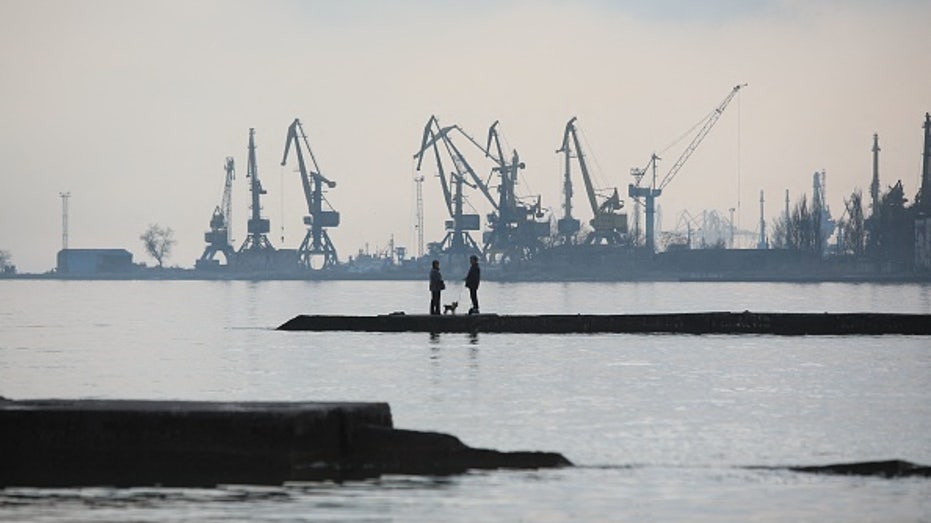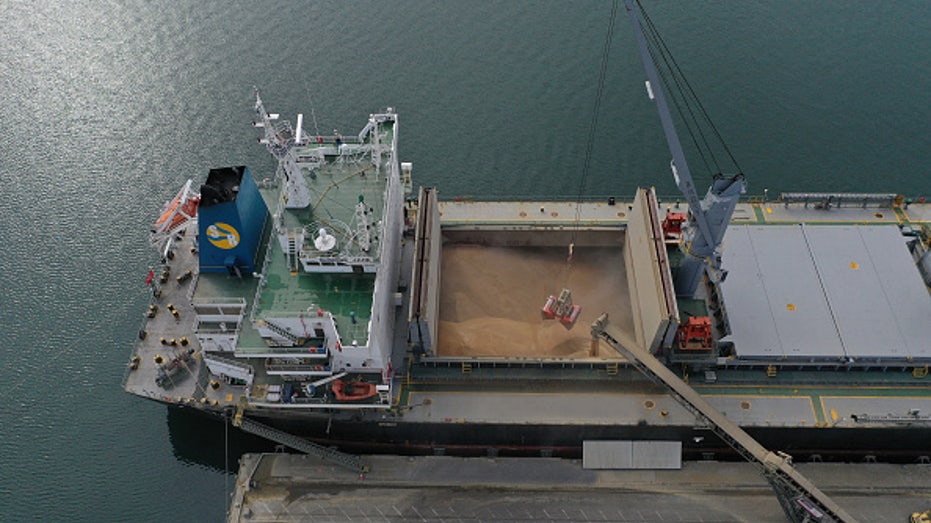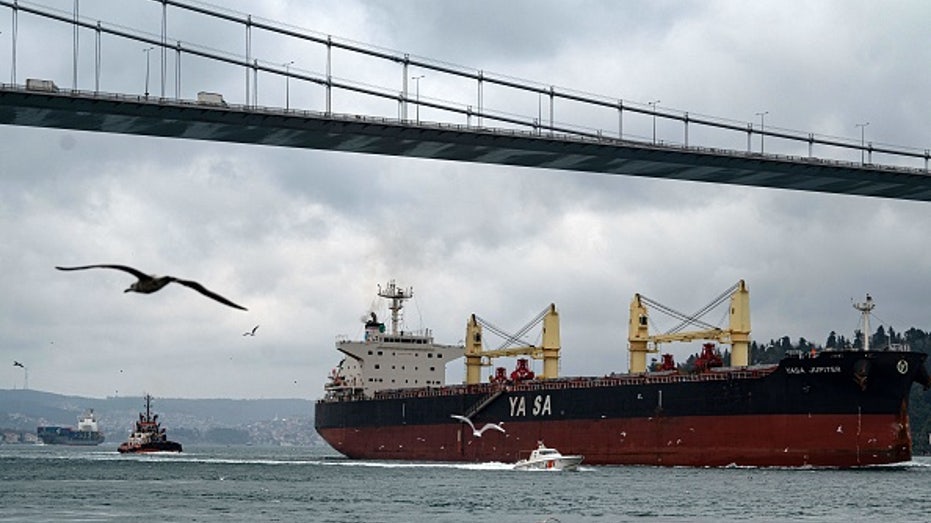Hundreds of ships trapped by Ukraine war, endangering sailors and global supply chain
The war in Ukraine has severely hobbled shipping in the Black Sea
Is the Russia-Ukraine conflict affecting supply chain issues?
Alba Wheels Up International founder and Chairman Salvatore Stile discusses the U.S. supply chain issues as problems continue to stifle progress.
The crew on a Bangladeshi cargo ship stranded near the Ukrainian port of Olvia heard an explosion, then the bridge was engulfed in flames.
A missile struck the MV Banglar Samriddhi at 5:25 p.m. last Wednesday, killing one crew member and leaving several others with serious burns, according to Bangladeshi crew members, their families and Ukrainian authorities. It was the fifth merchant ship to be hit by artillery off Ukraine’s coast since Russia invaded.
BIDEN ANNOUNCES BAN ON US IMPORTS OF RUSSIAN OIL, GAS: LIVE UPDATES
The war in Ukraine has severely hobbled shipping in the Black Sea, with broad consequences for international transport and global supply chains. Dozens of cargo ships are stranded at the Ukrainian port of Mykolaiv, shipping trackers said. An estimated 3,500 sailors have been stuck on some 200 ships at Ukrainian ports, according to London-based shipping tracker Windward Ltd. More ships are stranded around the globe than at any point since World War II, maritime historians said.
The result is a shutdown of the world’s second-largest grain exporting region. Ukraine accounts for 16% of global corn exports, and together with Russia, 30% of wheat exports. Global wheat prices have jumped more than 55% since the week before the invasion.
WHEAT PRICES HIT 14-YEAR HIGH, FOOD SHORTAGE FEARS RISE
"This shock to global grain supply is the biggest supply shock since the OPEC oil cuts in the 1970s," said Salvatore Mercogliano, a professor at Campbell University in North Carolina and former merchant mariner. "It will mean food shortages in the Middle East and Africa, and inflation across the world."
Making matters worse for global shippers, thousands of Ukrainian and Russian seafarers are stuck in ports around the world, leaving shipowners scrambling to find replacement crews to keep strained supply chains rolling.
In the Black Sea and the adjoining Sea of Azov, which are important food and oil export routes, five tankers and cargo ships have been struck by missiles, according to Ukrainian port authorities. The stricken vessels include tankers, container ships and bulk carriers from Japan, Turkey, Moldova and Estonia, ferrying cargoes including diesel, clay, and grain.
Ukrainian authorities generally blame Russia, which has amassed a flotilla of warships along Ukraine’s coast. Russia has denied responsibility for the attacks. Russian forces have been targeting missiles at infrastructure in Ukrainian ports—part of a plan to seize Ukraine’s southern coast to cut it off from the sea and suffocate its economy.
On Thursday, an Estonian cargo ship, MV Helt, sank after being hit below the waterline, the vessel’s owner said. Ukraine’s navy has accused Russia of forcing commercial ships to move into a dangerous area of the Black Sea to conceal their own military maneuvers. "Russians [used] the Helt ship as a shield to hide behind it from Ukrainian antiship weapons," Ukraine’s State Border Guard Service said on Facebook.
Russian forces also have detained two Ukrainian merchant ships, Ukraine’s port authority said.

Pier at a coast of the Sea of Azov in Ukraine's industrial port city of Mariupol. Mariupol lies on the edge of the front line separating government-controlled territory from that overseen by Russian-backed separatists in the rebel stronghold Donetsk. (Photo by ALEKSEY FILIPPOV/AFP via Getty Images / Getty Images)
Ukraine’s paltry fleet is no match for Russia’s naval forces. The Ukrainian navy lost most of its ships when Russia seized its naval headquarters during the 2014 annexation of Crimea. Last week, the navy scuttled its only frigate in Mykolaiv to avoid it being captured by the Russian navy, Ukrainian defense minister Oleksii Reznikov said.
The North Atlantic Treaty Organization warned on Thursday that there is a high risk of collateral damage for any ships in the Black Sea. The International Maritime Organization said on Friday that it would hold an emergency session on March 10 and 11 to address the war’s impact on shipping following requests from numerous governments.
The last NATO naval vessel left the Black Sea about a month before the invasion. Moscow has warned NATO to stay out of waters it claims as its own.
The International Transport Workers’ Federation has declared the waters off Ukraine a "warlike area" and called for further protections for sailors. Advocacy groups for seafarers said many stranded crews are running low on provisions and fuel.
On the first day of the invasion, Ukraine suspended operations at all ports, diverting cargo ships to ports in Turkey, Romania and the former Soviet republic of Georgia, and the Russian Navy blocked transit routes along the coast. Traffic ground to a halt. With few daring to travel in the north part of the Black Sea and the Sea of Azov, global freight rates for tankers surged to highest daily rates in a decade, while insurance premiums in areas affected by the fighting have jumped to as much as 5% since the invasion, shipping companies say. That means an additional cost of hundreds of thousands of dollars per voyage, according to data from Windward.
RUSSIA-UKRAINE WAR: GLOBAL SHIPPING TITANS SUSPEND BOOKINGS TO, FROM RUSSIA
That is further straining global supply chains for grain, which already had been hurt by two years of pandemic-induced disruptions. Poorer countries that depend on imports could see supply shocks. Authorities are bracing for price spikes in Egypt, Turkey and Syria. Egypt imports 85% of its wheat from Ukraine and Russia.

Wheat is loaded onto a bulk carrier in Victoria, Australia. Wheat soared to the highest level since 2008 on mounting fears of a global shortage as the Ukraine war shuts off over 25% of the world's exports. (Carla Gottgens/Bloomberg via Getty Images / Getty Images)
On Feb. 24, the first day of the invasion, the Turkish-owned Yasa Jupiter, a bulk carrier hauling commodities for U.S. trading giant Cargill Inc., was hit by a bomb off the coast of the port city of Odessa.
The following day, Moldovan-flagged tanker Millennial Spirit, laden with 600 tons of oil and diesel, caught fire after being hit by a missile, severely injuring two crew members. The Japanese grain bulk carrier Namura Queen also was hit by a rocket.
"The sailors now face a stark choice," said Munro Anderson, a partner at London maritime-security company Dryad Global. "Stay and risk running out of food and becoming collateral damage, or try to sail to freedom and risk hitting a seaborne mine."
The 29-member crew of the Banglar Samriddhi, the Bangladeshi cargo ship, dropped anchor in the Ukrainian port of Olvia on Feb. 23, prepared to load clay and raw materials for manufacturing ceramics destined for the Italian port of Ravenna.
Third engineer Hasidur Rahman, the main breadwinner from his family in Bangladesh’s rural south, called his brothers to say he had arrived, and to announce some news. "I will come home and marry next year," they recalled him saying. "We won’t be in Ukraine for long."
Third engineer Hasidur Rahman was on the Banglar Samriddhi when it was hit by a missile.

Turkish-owned Yasa Jupiter hit by Russian bomb outside Ukrainian port city of Odessa. (Photo by YASIN AKGUL/AFP via Getty Images / Getty Images)
Within hours, Russian forces poured across Ukraine’s border, and shipping along Ukraine’s coast ground to a half, trapping the Banglar Samriddhi and hundreds of other vessels.
From the deck, the crew heard the sound of faraway explosions and anxiously watched smoke rising on the horizon. "Air attack at morning time…May Allah saves all," second engineer Asif Islam wrote on his Facebook feed.
The ship’s owner, the Bangladesh Shipping Corp oration, instructed Capt. Noor-e Alam to sail out to international waters, but he couldn’t get permission from Ukrainian authorities. The crew was told that dozens of sea mines had been laid around the port’s entrance. "We could not come out because mines were blocking the channel," Mr. Alam said.
Mr. Rahman began to wonder if he would make it out of the crisis alive. His family in Bangladesh was bombarding him with messages. "We are trying to get relocated, but it’s hard," he said in a Feb. 26 text to his younger brother.
The fighting was getting closer, as Russian forces advanced west from Crimea. On Feb. 27, news reached the crew that a Japanese cargo ship in Ukrainian waters had been hit by a missile. The crew hoisted Bangladeshi flags in the hope it might protect them.
GET FOX BUSINESS ON THE GO BY CLICKING HERE
Mr. Rahman told his family that the Banglar Samriddhi would hunker down in the port. The captain ordered food to be rationed.
Diplomatic efforts to evacuate the crew were accelerating. Bangladeshi officials in Warsaw were lobbying the Ukrainians, and organizations representing Bangladeshi workers in Ukraine were preparing to drive to Olvia to collect the crew themselves.
Around 5 p.m. on March 2, Mr. Rahman climbed up to the navigation bridge to get better cellphone reception and called his family. He sought to assuage his brothers’ fears and told them his work would allow the family to escape poverty. "Don’t worry about me, I’m fine," he said.
Then his brother Golam heard an explosion. The line went dead. His other brother learned later that the missile had killed Mr. Rahman.




















